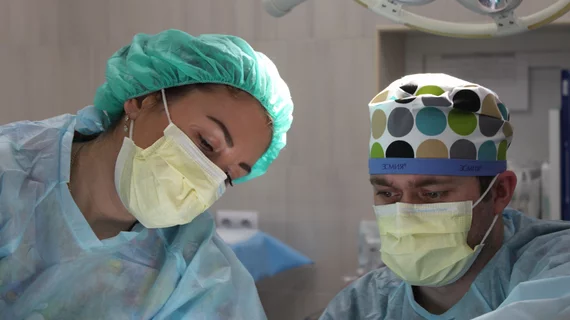AFib after surgery could be a warning sign of heart failure
Patients who develop atrial fibrillation (AFib) after surgery face a higher risk of being hospitalized for heart failure, according to new data published in the European Heart Journal.[1]
The study’s authors tracked data from more than 76,000 patients who underwent heart surgery and more than 2.9 million patients who underwent a surgery unrelated to their heart. All patients were treated in one of 11 U.S. states from 2016 to 2018. The median follow-up period was 1.7 years.
A total of 18.8% of heart surgery patients developed AFib, seeing their risk of a heart failure hospitalization increase by a third. Also, 0.8% of the patients undergoing surgery unrelated to their heart developed AFib; their risk of a heart failure hospitalization doubled.
“Our study, which to our knowledge is the largest study to date, shows that post-operative AFib is associated with future heart failure hospitalizations,” first author Parag Goyal, MD, MSc, an associate professor of medicine in the Weill Department of Medicine at Weill Cornell Medicine in New York, said in a statement. “This could mean that AFib is an important indicator of underlying but not yet detected heart failure; or it could mean that atrial fibrillation itself contributes to the future development of heart failure. While this study could not specifically address which of these mechanisms are at play, our hope is that this study will inspire future work into exploring the underlying mechanism seen in our important findings. Regardless of the mechanism, our study shows that post-operative AFib is clearly an important entity that merits attention and incorporation into decision making.”
Patients developing AFib after surgery may also require “more aggressive treatments” for high blood pressure and diabetes, Goyal added.
In a separate editorial, specialists from the Cedar-Sinai Smidt Heart Institute wrote that this analysis could help pave the way for a time when specialists intervene more aggressively after a patient develops AFib following surgery.[2] However, they noted, more research is still required.
Related Heart Rhythm Content:
Marijuana use linked to heart rhythm issues in older adults
What peridevice leaks after LAAO mean for patient health
NOACs comparable to warfarin when treating AFib patients with valvular heart disease
References:
- Parag Goyal, Michael Kim, Udhay Krishnan, et al. Post-operative atrial fibrillation and risk of heart failure hospitalization. European Heart Journal, ehac285.
- Melissa E Middeldorp, Christine M Albert. Post-operative AF and heart failure hospitalizations: what remains hidden in patients undergoing surgery. European Heart Journal, ehac335.

